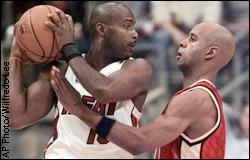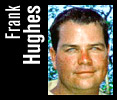| | I wonder if NBA commissioner David Stern sits in his exotic chair on high
and gazes down in wonderment at the child that he at least partially helped
create -- helped create by ramrodding the current collective bargaining
agreement down the throats of 400 unwitting basketball players whose union is
about as stable and strong as Frank Gifford has become.
|  | | Tim Hardaway is an example of a current player playing the market. |
Of course, Stern would never ever tell you the honest-to-God truth about
his feelings because he communicates in an eloquent double-speak that
essentially always says the same thing: The NBA is alive and well.
And to a degree, yes, that is true. Certainly Stern enjoys the power
bestowed upon one who directs a collection of the best basketball talent in
the galaxy.
But one has to wonder if Stern is actually proud of the direction in which
his league is going -- a league that only a few years ago, if I am not
mistaken, Stern preached the players and owners need to work together in
honorable accord to achieve the highest level of popularity and fiscal return.
Surely, Stern could not have predicted that by strategically limiting
salaries -- the basis of the current CBA -- and thus pouring more money into
his constituents' -- i.e. the owners' -- coffers, he would create a level of
mistrust and distrust between the employees and management that perhaps never
can be bridged, certainly not at the current pace things are progressing.
In essence, Stern -- wittingly or unwittingly -- has created an atmosphere
in which every player is out for himself, and every shred of honorable business
acumen is tossed out the window like the soiled butts of Phillip Morris'
reprehensible creations.
| |  | |
| Anthony |
I was most deeply disturbed by the story this summer in which Greg Anthony
verbally committed to the Atlanta Hawks, only to renege on that promise and
re-sign with the Portland Trail Blazers for more money.
It's not, I guess, so much a surprise that such a thing happened. But it
is a surprise that Anthony was the player involved. He is one of the smartest
players in the league. He majored in business at UNLV -- which I assume is
studying how to rig a slot machine. But my point is, the guy knows what he is
doing. This was a calculated move. It wasn't like he made a decision, then
his emotions got the better of him and he decided to go back to his beloved
Blazers. He knowingly played the Blazers off the Hawks, driving up the price,
using Stan Kasten and Pete Babcock. Both those men said in all their time in
this profession, never before had a player shamelessly gone back on his word
in such a manner.
Now we see the same thing happening with Tim Hardaway. He got a one-year,
$12 million offer from the Miami Heat. He wants a three-year deal, and is
threatening to go to the Indiana Pacers to do what is best for "Tim Hardaway
and Tim Hardaway's family."
This is a transparent ploy, because if Hardaway passed up $10 million
guaranteed to play for $2.25 million in Indiana, Tim Hardaway's family might
disown him. At least make a threat plausible, Tim.
But the more disturbing, underlying fact is that Hardaway is, like
Anthony, using one team to hijack another, threatening to leave if his
demands aren't met.
Are these players wrong?
It's hard to say since they are participating in a league where the
primary challenge of a general manager is not so much to evaluate and develop
young talent anymore but to dispose of "bad contracts" in order for teams to
make runs at talented free agents.
A player with a contract of a few million is primed to be traded as a
"throw-in" during a deal that needs salary requirements to be met. In the
proposed four-team, 13-player deal that fell apart, only four of
the players were primary, while the other nine were "throw-ins." And these
are peoples' lives we are talking about.
I was speaking with the wife of a player one day who said why not take
money over loyalty, when teams have no loyalty to their players.
| |  | |
| Williamson |
And who can argue when you hear about "wink-wink" deals like the Sacramento
Kings promising Corliss Williamson a big payday down the road for taking less
now. I have no problem with such under-the-table, handshake agreements,
because with the way the rules are instituted, sometimes it is impossible to
pay a player at that point.
But I do have a problem when teams make the promises, then conveniently
forget such promises were made when it doesn't fit in with the grand plan.
Things are only going to get worse this season, when players discover that
their first paychecks are 10 percent shy of what they once were, because of
the clause in the collective bargaining agreement that requires players to
return a portion of their salaries if they exceed a certain percentage of
basketball related income.
No longer is the league a partnership. No longer can players and management
work together to build a winning tradition because the only history that is
being built is deciding which set of knives to use to put in the other sides'
backs.
In a way, this is a byproduct of our society, a sign of the .com times where
stock options have replaced the family pet as the thing over which to fawn.
But this too is a sign of Stern's all-or-nothing collective bargaining war he
orchestrated only two shorts years ago. It is akin to post-war traumas that
never can be seen coming, and only now are we feeling its ill effects.
Frank Hughes covers the NBA for the Tacoma (Wash.) News-Tribune. He is a regular contributor to ESPN.com. | |
ALSO SEE
Hardaway steamed by Heat, considers joining Pacers
Hughes: Blunder by the Bay
|




